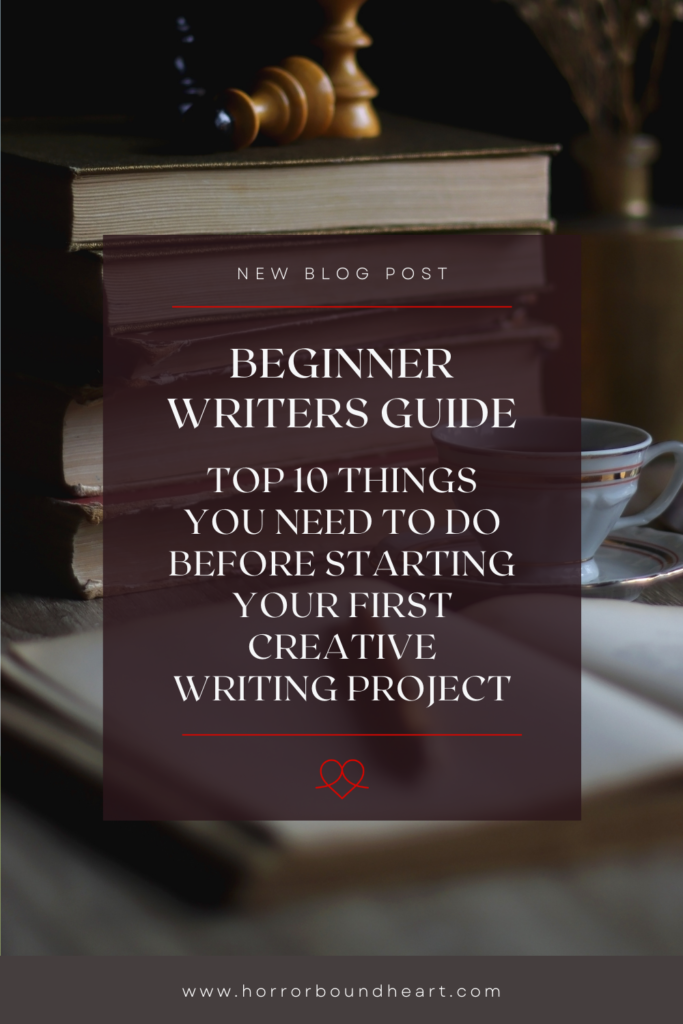Square one: the drawing board
So, you want to be a writer. Then why aren’t you writing?
The desire to write can be appealing but also terrifying. Curiosity captures our imagination but fear lurks in our mind and holds us back. So how do we ever move out of our ordinary life and take that great leap to becoming a writer?
First things first, you can absolutely become a writer. It might be that the label itself is intimidating, because it suggests some level of authority. However, the label is simply descriptive. There is no system of judgement or approval before you are considered a writer.
If you are writing, that makes you a writer by default.
Now we’ve cleared that up, here are my top ten tips for things you need to do before you start your first creative writing project.

1. Take your first step
The best tip for becoming a writer is to just start writing. Before you begin mapping out an entire novel, try a bit of free writing. This is where you sit down with a blank piece of paper and start writing whatever comes to mind.
You could write down your inner monologue, you could describe what you see in the space around you, or you could jot down some free-flowing narrative without having a clear idea of who the characters are or where their story is going to take them.
Being mindful of what your brain picks up in the moment can help you follow threads and work on them in the future. Do you always end up writing about nature and the environment? This can help you work on developing rich landscapes that will immerse your reader in the world you have created. Do you notice the feelings that you experience when you are writing, e.g. you’re tired and frustrated, or excited and buzzing with energy? This can help you describe the depth of emotions your characters are experiencing and the reader will feel it too!
Free writing is a great place to begin if you don’t have a specific idea in mind, and can help move you forward when you’re feeling creatively blocked.
2. Keep track of your ideas
Your ideas are gold and they deserve to be treated with care. These are precious objects and you do not want to lose them!
Keep a journal where you can write down your ideas, then refer back to it when need a burst of inspiration.
If you’ve thought of something but it doesn’t quite work within the project you are working on, don’t throw it away! Save the idea for later. You never know when it might come in handy and there could be a project in your future that would be the perfect fit.
If you have a lot to keep track of, you may even want to consider some sort of organisational system to help you categorise your thoughts. You could have a section for characters, settings, themes, genres, or any other subject which works for you. This will be an invaluable resource you can refer back to regularly. Annotate, label, and colour-code to your heart’s desire.
3. Start small
It can be really daunting looking at that blank page, so try getting started with a writing sprint.
Pick something to work on, whether that is a plot outline, a scene, or a character bio. Set a timer for 10 minutes and write as much as you can about the topic you have chosen, without going back to undo or edit anything. Keep writing until the timer is up!
Once you have reached the finish line, then you can read through your work and make notes for parts that need to be revised.
The beauty of a writing sprint is that it is so short and effective. Remove judgement and work within the timeframe to get your words flowing.
4. Pick your format
This one sounds easy, but you may need to try a few different styles before you settle on what suits you best.
Do you prefer writing things out by hand? Is there a certain type of pen you feel comfortable working with? Have you got a huge collection of beautiful notebooks that feel like a treat to write in? You might find a perfect combo of pen + paper = magic.
Do you prefer the click-clack of typing on a keyboard? Is there a writing software that you enjoy using? Have you got a specific system for structuring things in a digital document? You might find a perfect combo of hardware + display = magic.
I like free writing by hand and letting my ideas come naturally onto the page. I also like drafting my stories in a digital document, cutting and pasting my way through multiple revision stages. I will use whatever format suits me best for the goal I have in mind. You can mix and match to your heart’s content.
Writing is writing, whether it is on a page or on a screen.
5. Find your comfort zone
Get settled into an environment that allows you to focus on your creativity.
Artists can be creatures of habit. Is there a spot at home where you can set up a cosy writing corner? Make it comfortable and have everything in its place. Consider the lighting, the noise around you, and if you are likely to be interrupted by anyone while you are writing. You might find it easier to achieve consistency with a regular writing routine here in your safe haven.
Artists can find inspiration all around them. You may prefer to do your writing out and about. Is there a familiar public space that presents you with an endless stream of life stories from all the people who pass by? Or do you have a favourite natural space just brimming with all the possibilities of stories you could create there? Keep a bag of writing supplies ready to take with you so you can take a writing adventure whenever the urge to explore comes calling!
6. Discover your core values
Understand your why to harness your motivation.
What is it about writing that is appealing to you? What do you want to bring to the pages? And what do you want to get out of it?
Spend some time thinking or journalling about what is at the heart of your writing. There are no wrong answers here! If you just want to have fun putting pen to paper, that’s great! If you would like to learn or improve your writing skills, that’s fantastic!
You might want to write something in your own voice and shed light on lived experiences. You might want to experiment with something that will challenge you to step outside of your other roles in life and shed the everyday labels you carry.
Once you have identified what is driving you, you’ll have a better understanding of your expectations. Setting your intention will help guide you to the right destination and keep you true to your vision.
7. Set goals
Writers are well-known to be prone to procrastination! Ward off indecision and uncertainty by setting a clear goal.
Having a goal gives you a clear vision of what you want to achieve. You can then determine the steps to get yourself there. Breaking things down into realistic steps will help you leave the starting blocks and keep you going all the way to the finish line.
Have a planning session where you decide what your goal, or goals, are and what exactly you would like to work on first. Aim to understand the tools and skills you will need to achieve it. You can mark out the finish line and any meaningful milestones along the way. Undertaking your work in realistic stages will help you get started and make the project seem less daunting.
Don’t forget to celebrate your goals when you get there! Be proud of what you have achieved and enjoy the sense of progress before embarking on your next goal.
8. Find your people
Sharing is caring and the people around you matter. Being part of a creative community is a place of endless discovery, and can be an especially powerful experience when you are beginning something new.
Take a look at your current circle. Are any of your friends, family and colleagues following creative pursuits in their professional or personal lives? Can you talk to them about your creative aspirations and will they support your endeavours? The people around you should know you better than anyone and can be a good starting point to encourage you to follow your dreams.
There are many ways to find community and having a shared interest is a strong foundation for connection. Look for local writing groups or classes that you can join. This will give you the benefit of learning something new as well as connecting with like-minded people.
The internet offers us access beyond the scope of our immediate surroundings and you can surely find a writers community online to engage with. Check out your preferred social media platform, join a forum, browse blogs or find a genre website that suits you. There are many opportunities to find a friendly support group, team up with a critique partner, and connect with writers of all different backgrounds from all around the world.
9. Believe in yourself
All it takes to be a writer is to write.
Be true to yourself and authentic in your work. Bring your background, culture, identity and passion to your writing. You are capable of creating art, and everyone has a story inside them. Whether you are writing for yourself or for an audience, you can bring your own unique voice to the page.
By believing in yourself, you can approach your writing from a place of self-confidence rather than self-criticism. Write from the heart and love what you do. Anyone is capable of becoming a writer; every story is built one word at a time. You’ve got this!
10. Read, read, and read some more
Every writer is first a reader.
If you’re a huge fan of a particular genre, immerse yourself into that field and devour everything you can. Read a variety of authors, read books from countries all around the world, read short stories and novellas and novels and series. There will be unifying themes and identifying factors which form the basis of the genre itself, but there are so many ways to add different flavours. Find what works for you but don’t limit yourself to cliches.
If you’re an equal opportunities reader and love all types of books then that’s good news, you have entire libraries to choose from! Vary your reading material and see where your style of writing fits in. If you want to try different techniques then read outside of standard fiction. Read poems, blogs, fan fiction, zines, and anything else you can feast your eyes on!
Never stop learning, and never stop reading.
Just write something
Anyone can be a writer, and that includes you! If you’re uncertain where to start then I hope the steps above can help give you a nudge in the right direction.
Understand your motivations for writing, set your intentions and immerse yourself in an environment that inspires your creativity.
Indulge in your writing process, make it personal and take time to play in the realm of your imagination.
Don’t hold back! Let your ideas flow and enjoy the experience.
Once you’ve taken the first brave steps and gotten started, there are many ways to develop your writing. You may want to form a practice or habit that suits your goals and works within your lifestyle. Come back again for future posts to help you continue on your creative path.
I wish you well on the start of your writing journey!
Let me know in the comments:
What project are you planning?
What goal are you working towards?
Where is your favourite place to write?


